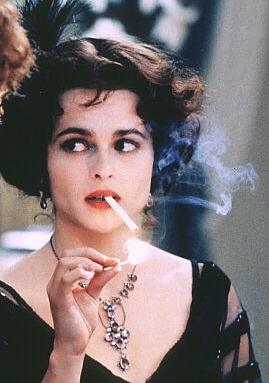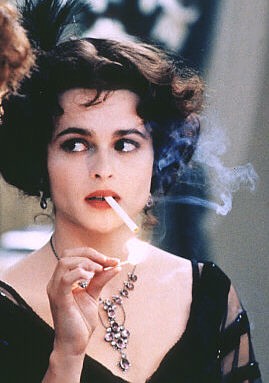Henry James, Reviewed by Henry James
by Sarah Marian Seltzer


I immersed myself in a Henry James novel and then tried to review the book. This is what happened to my writing style.
To-day I pose to myself the task, at last, the matter, that is, of drawing a conclusion after a considerable interval of ploughing through the pages of Henry James’s “The Wings of the Dove,” accomplished despite the distraction of reading several less lengthy — and more contemporary, at that, works — such detours as are inevitably taken by a person in the course of a momentous, as it were, endeavor.
Of course, the book.., well, the book was quite formidable. But having finished my reading I ought to put it to myself, frankly, to give a name to exactly what I did and didn’t find satisfying, at the heart of it, in James’ novel, which chronicles a specific “set” of schemers and schemed-upon characters in London and, of course, unforgettably as it turns out, in Venice. I throw myself the question, then, which looms continually over my head: Did I, at the final conclusion of the thing, enjoy the doings and discussions of Kate Croy, Merton Densher and their “set,” and in particular, of course, their machinations in regards to the fate of poor — for the epithet must forevermore affix itself to her name — Milly Theale?
Well — the novel was prodigious, certainly. Magnificent as Milly herself.
There arose a sense, as it were, during my progress, that despite James’s attention to circles of social intercourse that couldn’t, in good faith, be called anything but rarefied — that still, his plots are marked by the basest sort of pecuniary maneuvers, the grimmest cruelties. A kind of wary discomfort, furthermore, in encountering such troubling portraits surfaced throughout my reading, nevertheless it does not follow that James’s depictions, while necessarily harsh, contained untruths. Indeed I have seen, in my limited three decades of existence — encompassing in their span very little fortune-hunting and almost no underhanded impositions on consumptive heiresses — a great deal, that is to say almost limitless, social rigidity and, one must also add, capacity for greed and selfishness, all of which are shown by James in his process of storytelling so that, if we must be honest, it has both agonizing and resonant effects on the reader.
Yet what also arises unceasingly, I fear, is frustration with the obliqueness of his prose — a desire even, at moments, to “turn my face to the wall” as Milly herself does! This irritation, has, no doubt, something to do with my waning attention span of late, attributed to the ascent of the internet, and that entity’s hold, notorious, upon my brain. I found myself thus at opposite extremes from my natural — or Tweet-enabled, I own it — habits, but, as a consequence of this intensified reading, also improving my focus, yet occasionally out of my depths in such a way as I could only say that it was extraordinary, most extraordinary, and it became the more extraordinary the more I got at it. Prodigious, really.
James’ incisiveness, heretofore, has established itself in my mind, and not consciously either, as not an insignificant thing at all. Yet time has proven, for that matter — or at least my own experience of it — that his contemporary, whom he belittled once or twice, an American who was indisputably a woman of her country, Edith Wharton, was at day’s end the more immortal prose stylist; at least, meaning, one might say, that a great many of her words a century later seem to indicate something concrete and are not, for the most part, simply adjectives, asides, and parentheticals stacked close upon each other to claustrophobic effects.
As for the ultimate question at hand, namely, what I actually thought of the novel, whether, at base, I would say it were a “good book” in the classic sense… ah! Let us draw the curtain of the Palazzo window, in a metaphorical way, as it were, and leave it behind at last. For the time being, then, it is sufficient, I think, to say, as Kate Croy herself once did, that “we shall never be again as we were!”
Previously: Middlemarch Is a Sexy Novel About Sex
Sarah Marian Seltzer is a writer in New York City. Now she really wants to watch the Helena Bonham Carter adaptation with a big bottle of wine. Find her at @sarahmseltzer or sarahmarian.tumblr.com.